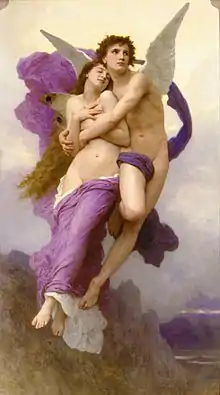Psyche (mythology)
Psyche (/ˈsaɪkiː/;[2] Greek: Ψυχή, romanized: Psukhḗ) is the Greek goddess of the soul. She was born a mortal woman, with beauty that rivaled Aphrodite. Psyche is known from the story called The Golden Ass, written by Lucius Apuleius in the 2nd century.
| Psyche | |
|---|---|
Goddess of the soul | |
 The Abduction of Psyche by William-Adolphe Bouguereau (1895) | |
| Symbol | Butterfly wings |
| Personal information | |
| Parents | Unnamed King and Queen[1] |
| Siblings | Two unnamed sisters |
| Consort | Eros |
| Children | Hedone |
Mythology
Early life
Psyche was the youngest daughter and the princess of a Greek king and queen. She also had two elder sisters. She was very beautiful. She was so beautiful that many people and priests started thinking of her as the Next Aphrodite. When Aphrodite, the Greek goddess of love and beauty, saw this, she was outraged. She sent her son, Eros, the Greek god of love to make Psyche fall in love with a bad person.
Her two elder sisters were both jealous of her beauty. When Psyche was 17, her two sisters got married and were sent away with their husbands to their respective kingdoms. Here, Psyche was alone. She had no friends.
Marriage to Eros
Her father, the king, saw this problem and confronted the Oracle of Delphi for the solution of this problem. From inside the priestess, Apollo himself spoke. He said, "Despair, king. Your daughter will marry a beast even the gods fear. Dress her in funeral clothes and take her to the tallest rock spire in the kingdom. There, she shall meet her doom." Hearing this, the king was heartbroken. But since he had got direct orders from Apollo, he did as he was ordered.
He took her in funeral clothes to the tallest rock spire in the kingdom. Psyche waited for the beast to come. But when the Beast did not come, she took matters in her own hands. She jumped off the spire. Everyone in the kingdom thought she was dead.
But Zephyrus, the Greek lord of west wind, had saved her from her death. He had taken her to Eros's palace where she waited till the night for her husband to return. There, she saw that the palace was very big and each cupboard was filled with gold. When Eros returned, he said to Psyche in pure darkness that she must not see him. She must not try to see him and he can't tell her his name or it would ruin everything.
The first few weeks of Psyche's life were great. But then she heard her sisters calling out her name.
See also
Notes
- The following summary is condensed from the translation of Kenney (Cambridge University Press, 1990), and the revised translation of W. Adlington by S. Gaseless for the Loeb Classical Library (Harvard University Press, 1915), with reference to the accompanying Latin text.
- Oxford dictionary
References
- Lucius Apuleius, The Golden Ass, translated from original Latin by Thomas Taylor, London, 1822. Read online at Internet Archive
Further reading
- Benson, Geoffrey C. "Cupid and Psyche and the Illumination of the Unseen." In Re-Wiring The Ancient Novel, 2 Volume Set: Volume 1: Greek Novels, Volume 2: Roman Novels and Other Important Texts, edited by Cueva Edmund, Harrison Stephen, Mason Hugh, Owens William, and Schwartz Saundra, 85-116. Luxembourg: Barkhuis, 2018. www.jstor.org/stable/j.ctvggx289.30.
- Dowden, Ken. "Psyche on the Rock." Latomus 41, no. 2 (1982): 336-52. www.jstor.org/stable/41532497.
- Edwards, Lee R. "The Labors of Psyche: Toward a Theory of Female Heroism." Critical Inquiry 6, no. 1 (1979): 33-49. www.jstor.org/stable/1343084.
- GAGNÉ, LAURIE BRANDS. "Inanna, Demeter, and Psyche." In The Uses of Darkness: Women's Underworld Journeys, Ancient and Modern, 23-62. Notre Dame, Indiana: University of Notre Dame Press, 2000. www.jstor.org/stable/j.ctvpj7c20.5.
- Haskins, Susan L. "A Gendered Reading for the Character of Psyche in Apuleius' "Metamorphoses"." Mnemosyne, Fourth Series, 67, no. 2 (2014): 247-69. www.jstor.org/stable/24521701.
- Katz, Phyllis B. "THE MYTH OF PSYCHE: A DEFINITION OF THE NATURE OF THE FEMININE?" Arethusa 9, no. 1 (1976): 111-18. www.jstor.org/stable/26307539.
- MAKOWSKI, JOHN F. "PERSEPHONE, PSYCHE, AND THE MOTHER-MAIDEN ARCHETYPE." The Classical Outlook 62, no. 3 (1985): 73-78. www.jstor.org/stable/43934919.
- McCreight, Thomas. "Psyche’s Sisters as Medicae?: Allusions to Medicine in Cupid and Psyche." In Lectiones Scrupulosae: Essays on the Text and Interpretation of Apuleius' Metamorphoses in Honour of Maaike Zimmerman, edited by Keulen W.H., Nauta R.R., and Panayotakis S., 123-67. Barkhuis, 2006. www.jstor.org/stable/j.ctt13wwxg3.14.